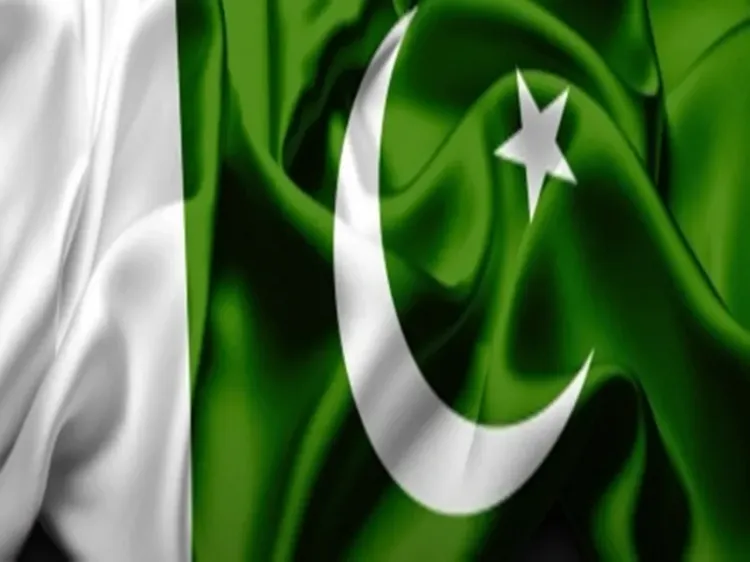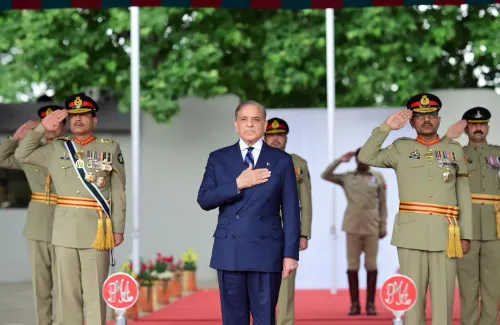Is Pakistan Reestablishing Its Role as the Frontline State?

Synopsis
Key Takeaways
- Pakistan's role as a frontline state is being reconsidered.
- U.S.-Pakistan relations are reviving after years of strain.
- Bagram Air Base's reclamation is strategically significant.
- Aligning with the U.S. carries inherent risks for Pakistan.
- Historical parallels to the 1980s are evident.
New Delhi, Oct 3 (NationPress) When Soviet forces entered Afghanistan in December 1979, Pakistan's geopolitical significance increased dramatically. At the time, the nation was under the leadership of General Zia-ul-Haq, an Islamist military ruler with a vision to Islamize the state and society, who recognized a strategic opportunity. Zia positioned Pakistan as the defender of the Western capitalist bloc against Soviet communism.
During the ensuing decade, Pakistan evolved into a crucial channel for American resources, weaponry, and covert initiatives aimed at countering Moscow's expansion. This pivotal alignment transformed Pakistan into the “frontline state,” a designation that yielded immediate benefits but resulted in enduring consequences: militarization, radicalization, and a reliance on foreign support that continues to influence its political landscape.
Fast forward four decades, and it seems history is on the verge of repeating itself. The United States, following its tumultuous withdrawal from Afghanistan in 2021, is reconsidering its military strategy in the region.
Central to these discussions is Bagram Air Base, the largest military installation outside Kabul, which served as the operational hub for American and NATO forces in Afghanistan and, by extension, a critical outpost for Washington in South and Central Asia.
While President Biden successfully withdrew U.S. troops, which led to the collapse of the Afghan Republican Government and the Taliban's return, President Trump appears intent on reclaiming the base to keep a watchful eye on China. Pakistan, adept at reinventing its role, is preparing to serve as the intermediary once more.
The relationship between the U.S. and Pakistan is witnessing a revival after years of tension, partly due to Pakistan's ambiguous role, with U.S. officials accusing Islamabad of supporting the Taliban while simultaneously positioning itself as an American ally during the two-decade War on Terror. There is a growing buzz among Pakistani and American officials and analysts that a defense agreement may soon be announced, reflecting the increased diplomatic engagement between the two nations.
It is worth noting that Washington has been urging Islamabad to permit American forces to utilize its airspace and military facilities for counter-terrorism operations in Afghanistan as needed. Moreover, Trump’s insistence that the Taliban relinquish control of Bagram Air Base is aimed at enhancing U.S. power projection in the broader U.S.-China rivalry.
In this context, Pakistan, despite its strong ties with Beijing, becomes a critical player on the geopolitical chessboard, making such a scenario feasible.
The speculation surrounding this possibility gains further support from the uptick in meetings between U.S. and Pakistani officials. Recently, President Donald Trump and Pakistan’s Prime Minister Shahbaz Sharif, along with the influential Army Chief, Field Marshal Asim Munir, convened in Washington.
The optics of these heightened high-level interactions are noteworthy, especially considering Munir has visited Washington three times in the last four months. During his initial meeting in June, Trump hosted Munir for an official luncheon, a privilege typically reserved for visiting heads of state.
Consequently, the shuttle diplomacy of Asim Munir indicates the urgency with which Islamabad is seeking to engage Washington. Trump appears open to the prospect of rekindling Pakistan as a partner, reversing the estrangement of his first term, when he cut military assistance and accused Islamabad of harboring terrorists.
The crux of this new partnership seems to hinge on Trump’s demand that Afghanistan cede Bagram Air Base back to the Americans. For Washington, reclaiming Bagram provides multiple strategic advantages, as it could serve as a forward base for surveillance operations against China, which is a use that President Trump has publicly stated.
However, reclaiming Bagram is no straightforward task. The Taliban, now in power in Afghanistan, perceive the base as a symbol of foreign domination.
Any attempt by the U.S. to retake it directly risks inciting a new insurgency. This is where Pakistan's role becomes crucial. By positioning itself as the frontline state once again, Islamabad can provide both logistical support and a narrative framework for America's reentry, framing it not as an occupation, but as a counter-terrorism partnership against the TTP and Islamic State affiliates.
It is important to remember that Islamabad has struggled to compel Kabul to take action against groups like the TTP, which pose threats to its national security in recent years, straining relations between the two countries.
Western media outlets are already shifting their narrative. With the TTP launching deadly cross-border attacks in Pakistan, new portrayals are framing Pakistan as a beleaguered nation besieged by militant violence.
This obscures Islamabad’s role as a facilitator of terrorism, instead depicting it as a victim deserving of Western support as a frontline actor against terrorism. This new narrative seems unlikely to be coincidental, especially given that Western media has frequently aligned with the interests of their governments.
The parallels with the 1980s are striking. Back then, Pakistan was celebrated in the West as the brave outpost resisting Soviet aggression. Billions of dollars in aid and weaponry flowed in, even as Pakistan’s military regime suppressed dissent at home. Today, with the Afghan Taliban back in power and China emerging as America’s primary adversary, the narrative eerily resembles the past. The only shift is Pakistan's relationship with China, but Islamabad has consistently demonstrated its willingness to double-cross for substantial financial gain.
Nonetheless, the implications of such a role should not be overlooked by Pakistanis. For a nation grappling with an economic crisis, political instability, and a resurgence of militancy, such a militaristic alignment with Washington risks further alienating the Taliban, potentially escalating violence within the country. It also poses a risk of estranging China, Pakistan's largest trading partner and benefactor, as this renewed U.S.-Pakistan camaraderie may jeopardize the trans-Himalayan partnership.
While Trump appears eager for swift re-engagement, the Pakistani military, which is striving to consolidate its dominance and secure external support, seems ready to comply. Moreover, Pakistan’s civilian government, which relies on the military establishment's goodwill, has limited influence.
However, if history serves as a guide, the repercussions will become increasingly apparent over time. The last time Pakistan donned the title of a frontline state, it emerged scarred by a radicalized society, a militarized political system, and a compromised polity. Now, as the U.S. looks toward Bagram and Pakistan seeks to regain its geopolitical significance, the cycle is set to restart. The crucial question is not whether Pakistan can rebrand itself as America’s indispensable ally but rather whether it can endure the fallout.









